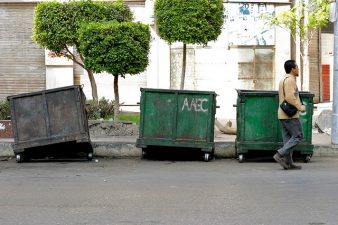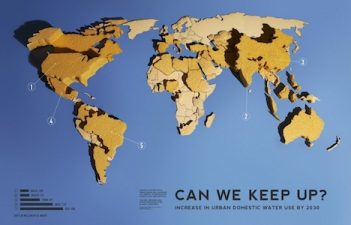 Hope floats. Want to help save water and feed nine billion people? Go vegetarian.
Hope floats. Want to help save water and feed nine billion people? Go vegetarian.
For vegetarians who have researched all the possible angles to justify their meatless habit – it’s healthier, we might say, or Islam sanctions it, it is no secret that raising meat taxes the environment. In addition to methane gases released, particularly by giant beef and chicken factories (a sustainable free-range facility is far less onerous), raising meat requires significant water resources. Now a leading water expert is spreading the news that scaling back our carnivorous ways is an important step in alleviating the Gulf countries’ serious water woes.John Anthony Allan is a Professor at the University of London’s School of Oriental and African Studies and an expert on the role that water plays in the Middle East. He is also the man who pioneered the concept of virtual water – how much water we use in order to produce certain goods, whether its food or clothing or machinery.
At a lecture delivered in Dubai last night, he was expected to help attendees better understand their water consumption in terms of the food that they eat, according to The National.
He explained that the average meat-eating American consumes five cubic meters of water compared to half of that, which vegetarians consume. But not all meat is equally water intensive.
“Beef requires 15,500 litres of water per kilogram compared with chicken, which needs 3,900 litres per kilogram,” he told the paper. So at the very least, consumers could think about reducing their beef consumption – since this requires the most unsustainable water footprint – and each more chicken instead.
“People often think about how much water is needed for domestic purposes, such as bathing, washing clothes or gardening,” Vesela Todorova wrote. “But the water necessary to produce food dwarfs all other uses, with agriculture taking between 80 to 90 per cent of water resources in the world,” she said.
Professor Allan added that most of the water any country needs is for food, since agriculture accounts for 80-90% of our water footprint.
With the Nile and Yellow Rivers drying up – both of which service enormous populations – and with the world population projected to reach nine billion within forty years, Allan and others suggest that governments need to oversee our agricultural habits (which are currently in the hands of individuals and businesses).
“While not everyone can be vegetarian,” he told The National, “if people in rich countries focused on eating less water intensive foods, there would be more available to grow food for an expanding world population.”
In 2008, Professor Allan was awarded the Stockholm Water Prize for his pioneering work.
:: The National
More on the Middle East’s Water Crisis
Gidon Bromberg on Water Security and Sustainability in the Middle East
Middle East Water Security Worries the Prince of Jordan
image via katclay




80% of the soy and corn is for cattlefood,
80% of the agricultural land is in use for cattle!
that’s why the west are stealing land in poor counties for biofuel without the cattlefood that’s not needed!
1 pound of animal, protein takes 3 to 18 pounds of vegetable protein , and 50 to 200 times more water.
the real fight in the world is about the animal products use.
Real men don’t eat meat and milk is for baby’s!
it can solve almost all problems!
Go green Go vegan!
The problem is industrial production of food, not animal foods.
Industrial corn, soy, and wheat is a monocrop disaster.
Pastured meat is the best way to go for the environment.
See, for example, The Omnivore’s Dilemma by Michael Pallin